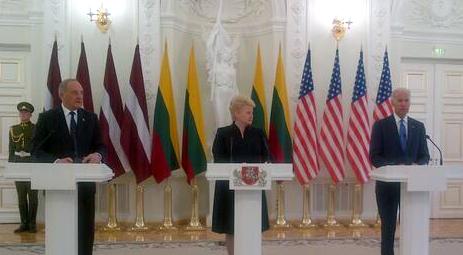 What is the strategic role and responsibility of NATO in this situation?
What is the strategic role and responsibility of NATO in this situation?
To my mind it is really very simple and straightforward—in every situation that threatens its allies, NATO must collectively guarantee the security of its members. In this situation there is no distinction between large and small allies—all are allies. The military capabilities of the United States are sufficient to allow it to provide its own security. However, if the U.S. were to choose to embark upon such a path, instead of utilizing the collective-security system that NATO offers, it is my opinion that the United States’ political influence on the world stage would be significantly curtailed. This, in turn, would have an adverse effect on U.S. security. Mr. Biden’s recent visits to Warsaw and Vilnius thus increased the security not only of NATO’s Northern, Eastern and Central European states, but also of the United States. His visits served as a manifestation of support for those Americans and Europeans striving to strengthen the Trans-Atlantic relationship on the basis of clear and commonly shared values—one of the most efficient ways of banishing the ghosts of the Heldenplatz.
It is deeply symbolic that this spring we celebrate the policy of NATO enlargement that significantly increased European security and brought us closer to a Europe that is whole and free and at peace. Joining the Alliance was a free choice of each and every new European democracy—nobody forced us to join. However, history had taught us that by remaining outsiders, we encouraged Europe’s undemocratic, destructive forces to adopt undesirable policies towards us.
That is why the choice that democratic NATO member-states must make in situations such as the annexation of Crimea is either to fulfill NATO’s mission—by increasing the security of those members who find themselves the most exposed along NATO’s outer flank—or to do nothing, in the hope that doing nothing will somehow lead the aggressor state to realize the folly of its ways and to become a better state. The cost of the first option will be high, but the cost of the second option will be catastrophic.
Latvia and the other Baltic states are among the smaller NATO allies. But compared to the United States, the absolute majority of Alliance members are also smaller, not to mention the relative size of each ally’s defense-related expenditures. Nevertheless, Article Five of the Washington Treaty does not distinguish between large and small NATO member-states. All NATO allies are under identical mutual collective-security obligations. The strategic importance of the Baltic countries to the United States is no smaller than that of any other NATO country. It is especially important to emphasize this now, when Europe is facing seemingly long-forgotten security challenges, when there may be a temptation to divide NATO allies into two categories: important and unimportant allies. In other words, drawing a distinction between those NATO allies who are “worth defending” versus those who are best thrown to the lions. This is a dangerous way of thinking—to trace the consequences of it, one must only look back a couple of generations. If this kind of thinking was ever to regain dominance, life would quickly become unbearable, both for those allies who some might be tempted to designate as “not worth defending” as well as those who would be lucky enough to be designated as “worth defending.” In this kind of world, a country’s membership in any particular geopolitical grouping would become completely irrelevant, and the entire concept of international security would become null and void. . . .
As European history has demonstrated on numerous occasions, an aggressor chooses his goals based on an assumption as to whether or not his aggression will be forgiven. Even if we do not yet have full clarity regarding the true goals of those who are carrying out the current aggression against Ukraine, and regardless of their ultimate goals, NATO must take collective steps that will increase the security of all NATO allies, bar none.
Andris Razans serves as Ambassador of Latvia to the United States.
Image: Latvian President Andris Bērziņš, Lithuanian President Dalia Grybauskaitė, and Vice President Joe Biden (photo: Department of State)
